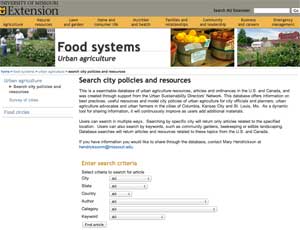
The Westport Plaza Farmers Market offers locally-grown produce in Midtown. Yesterday, the city council got a briefing on ways it could ramp up urban agriculture; for instance, helping to fund small businesses that could ensure corner grocery stores provide fresh local produce.
Urban agriculture is not just tomato plants in the back yard anymore.?It became a major grassroots movement in the last 15 years and cities need to plan for it just like they plan for streets or buildings, a new report concludes.
The report presented Thursday at the city council business session left council members pledging to do more to help plan and establish city farming and food distribution efforts.
For instance, they said, a fund for small businesses could lend money for corner stores, where many farmers could sell fresh food in neighborhoods where grocery stores are as scant as water in the desert.
The report provides an overview of urban agriculture and food service resources and practices in the United States and parts of Canada. The main goal was to provide ideas and resources that encourage and support urban agriculture in Kansas City, St. Louis and Columbia.
But it also created a searchable public website that shows nationwide efforts, documents, websites and resources related to the matter ? a kind of list of best urban farm practices.

The University Extension Service website collects best practices for urban agriculture.
Mary K. Hendrickson, an associate professor at the University of Missouri Extension, told council members that the web site might be the most important report result.
As urban agriculture has grown so have complexities associated with it, such as? allocating land, capital, water and coordinated efforts among complex city codes and zoning.
Most urban farms are less than one acre but farms up to 100 acres are possible that could gross more than $50,000 an acre and be important economic development tools, the report states.
It notes that a two-acre plot of organic soil in Kansas City, Kan., grosses over $100,000 in sales for the non-profit Cultivate Kansas City, a group involved in one of the proposals to buy Westport High School and Middle School.
A development group said this summer they want to turn the high school into a new pilot private school and that Cultivate Kansas City would use part of the middle school site for training in urban agriculture, a community greenhouse, gardens and orchards.
In August, Katherine Kelly, the cultivate group?s executive director, said it is ?expanding like crazy? and needs an educational space and community interaction site in the city.
On Thursday, Hendrickson told city council members that such expansions are happening nationwide and cities, universities and others must coordinate and plan for them.
Councilman Scott Wagner noted that on a visit to Austin, Tex., he found they had a food policy board for such planning and that some health insurance providers gave prescriptions for fresh fruit and vegetables.
He said the city council is studying allocating land for urban farms and also for institutional buying of food from them.
Councilman Scott Taylor suggested that the $1.5 million fund for small businesses could be used for the corner stores or possibly other urban farm needs.
Councilman John Sharp spoke of a more basic problem in times of hot weather and high water bills.
?One of he issues to deal with is being able to access water in an affordable manner,? he said.
Visit the website
?
meteor shower usain bolt steelers Closing Ceremony London 2012 Tom Daley Leryn Franco The Campaign
No comments:
Post a Comment
Note: Only a member of this blog may post a comment.